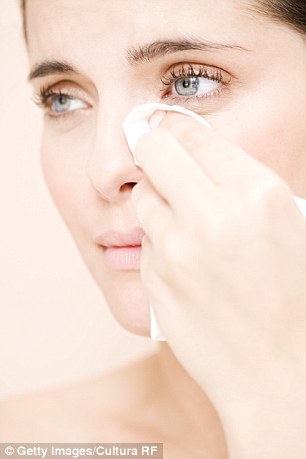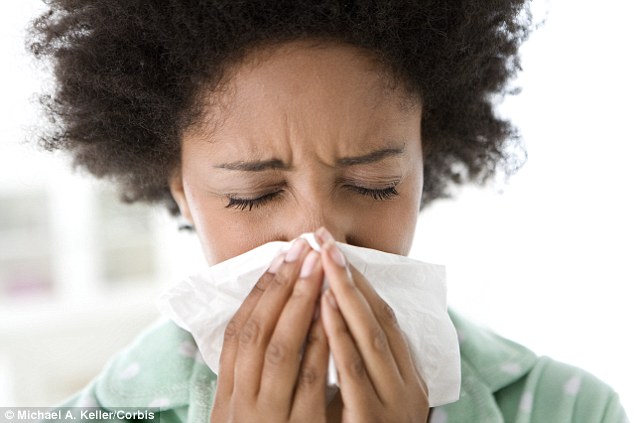ASK THE DOCTOR: What's the best way to get rid of cystitis?
I regularly suffer with urinary infections and have been taking a low dosage of antibiotics (one a day) for two years. The infections are getting more frequent - I have them about once every six weeks, and am then advised to take three a day. I have had different responses from doctors. One says I have no alternative, another is not at all happy that I have been taking these antibiotics for some years now. Can you advise?
Name and address withheld.

Some women, regardless of age, have recurrent urinary infections that are related to sexual intercourse
Recurrent urinary infections affect women rather than men. I often say the female urinary system is one of nature's worst design faults - second only to the human neck, which is particularly prone to stiffness or pain in middle age.
This is because a woman's bladder has a poorly functioning valve mechanism that often leaks, and is an outlet that allows germs in.
The urethra - the pipe which carries urine from the bladder and out of the body - is just over 2cm long in a woman, and nearly 20cm in a man.
More from Martin Scurr for the Daily Mail...
- DR MARTIN SCURR: A nasty bout of Covid three years ago made me lose my sense of taste and smell... am I doomed to live like this for ever? 30/12/24
- Would a jab allow me to have sex again at 93? DR MARTIN SCURR has the answer 28/10/24
- The surprising way osteoporosis can make you feel sick, reveals DR MARTIN SCURR... and if diet can REALLY help 23/09/24
- DR MARTIN SCURR: Try vitamin D cream to ease your itchy, flaking ears 16/09/24
- DR MARTIN SCURR: Yes, alternative therapies for cancer like Elle Macpherson's may help - they can offer the hope that doctors forget 03/09/24
- DR MARTIN SCURR: Why you should keep moving if you have a frozen shoulder 03/09/24
- DR MARTIN SCURR: Will taking antihistamines do me long-term harm? 20/08/24
- If I have arthritis, do I have to stop working? Ask the GP DR MARTIN SCURR 16/07/24
- Concussion is a risk... Princess Anne, 73, mustn't rush back to royal duties after she was 'hit on the head by a horse', warns DR MARTIN SCURR 24/06/24
- VIEW FULL ARCHIVE
You have not mentioned your age, but the problem is common in post-menopausal women, probably because a decline in the hormone oestrogen causes the lining of the urethra and the bladder to thin.
Typically it involves cystitis (an inflammation of the bladder), with symptoms of burning, increased frequency and a sense of always needing to go to the loo.
You have been treated with a strategy known as 'low-dose prophylaxis', where patients are given a small dose of a broad spectrum antibiotic to be taken every day for six to 12 months, sometimes longer. This reduces the frequency of episodes.
But if a new infection does develop, the best policy is to stop the low-dose regular pill and submit a fresh urine sample to the lab. The infection will, almost certainly, be resistant to the previous low-dose drug, so upping the dose of the same antibiotic may not be effective.
The organism must therefore be identified and the correct antibiotic chosen to obliterate that microbe; after a one or two-week course of the new antibiotic, the original low-dose regimen can be resumed.
This requires time, trouble, and the cost of a lab test. Indeed, a urine test is often skipped so costs can be contained, but it is an advisable step to take.
In post-menopausal women, some doctors also prescribe local hormone replacement therapy by way of oestrogen cream or pessaries - this can restore a healthy status to the tissues of the vulva and vagina, and seems to help improve immune defences in this area.
Some women, regardless of age, have recurrent urinary infections that are related to sexual intercourse - sex can move bacteria up the urethra and into the bladder. In these cases, it is vital to empty the bladder immediately after sexual activity.
Some doctors also recommend a single antibiotic tablet after every episode of intercourse.
In summary, I support the decision for you to be on low-dose prophylaxis, despite the misgivings we all have about long-term antibiotic use, as the benefit outweighs any disadvantage.
My proviso would be that your health should otherwise be good while you are continuing with this treatment.
And when you do have the misfortune to sustain an infection, the urine sample should be cultured, the offending bacteria identified, and their sensitivity to a suitable antibiotic identified. This is no place for educated guesswork.

'Epiphora is one of the most common problems seen by eye specialists'
My problem is that my eyes water all day and all night long. This has been happening for a year now, and although my doctor sent me to see an eye specialist, she was unable to identify the reason. I am 71 and I would be grateful for your thoughts on what I may be able to do to alleviate this.
Margaret Barton, Milton Keynes.
The technical term for watery eyes is epiphora, and it is one of the most common problems seen by eye specialists.
It is unusual that yours has been unable to reach an exact diagnosis - this will be necessary before you can be advised of an effective treatment.
There are a number of possible causes. It may be the result of an allergy, such as to the house dust mite, which can cause the surface of the eye to become irritated - tears are then produced to flush out the allergen.
Alternatively, the front of the eye may be inflamed - perhaps due to a condition called entropion, linked to ageing, where the eyelids turn inwards so that the lashes rub on the eye.
There is also a condition called ectropion, more common in the over 50s, where the eyelids sag and droop away from the eye.
The result is that the tears do not drain away properly to the nose and instead flow over the edge of the eyelid. Another possibility is that the drainage duct itself (called the nasolacrimal duct, or tear duct) has become blocked - perhaps due to infection or polyps. But none of these factors seems to apply in your case.
Paradoxically, the apparently excessive production of tears may, in fact, be down to having a rather dry eye.
The tear film is made up of three layers - oil, water and mucus.
The outer oily layer, secreted by glands located along the edge of the eyelids, prevents rapid evaporation and excessive dryness as well as ensuring that the tear film is distributed evenly across the eyeball.
If these glands are inflamed - as happens with a condition called blepharitis - it means that not enough oil is produced and the tear film is defective.
If the three components are not present in the right proportions, the film can break up, resulting in an overspill of tears - albeit the wrong sort of tears.
Blepharitis can usually be resolved with daily massage of the eyelids, applying a hot compress and keeping the area clean.
Your consultant may have carried out a fluorescein disappearance test - where a fluorescent dye is placed between the eyelid and the eye, and its presence checked some minutes later using a blue light - to assess tear production and drainage.
You may also have had your tear ducts syringed, to check for any blockages. The investigations in your case have not provided a diagnosis and I must conclude that you are one of the 5 to 10 per cent of patients who have functional epiphora - that is, watery eyes with no detectable cause.
This is sometimes treated by placing small tubes in the tear ducts to improve the drainage rate, though this is not always successful.
Even though you've had this problem for a year already, I suspect you may yet find that the symptom, mysterious as it is, will resolve. I would do nothing for now, and bide your time.
By the way... Fight colds with fruit, not supplements

Bin all those expensive supplements and eat fruits, vegetables, nuts and grains every day
My younger brother was battling his way through his second heavy cold of the autumn recently, complaining that it was unfair that he should be stricken yet again.
Given the regular doses of multivitamins to which he is partial, I could not restrain myself from asking how he ever came to believe that taking vitamins would give him any protection.
While I cannot give any evidence-based advice about how to avoid colds - apart from isolating yourself on a Scottish island - I do hold some very firm views about nutrition and health. There is no need to visit health food stores and purchase a selection of refined chemicals - a trip to the farmers' market or greengrocer is all that is needed.
There is, for instance, a mass of evidence that apples are a food that promote good health - along with many other whole foods that are natural and plant-based.
An apple has an antioxidant vitamin C-like benefit equivalent to a 1,500mg supplement of vitamin C, even though it only contains about 5mg of the actual vitamin. This is because there are other active beneficial chemicals in the apple: quercetin, catechin, phlorizin, and numerous others.
So bin all those expensive supplements and eat fruits, vegetables, nuts and grains every day, and reduce your dependence on the trickery of manufactured foodstuffs and supplements from factories.
If you do nothing else to avoid colds this winter, eat an apple or an orange every single day. Easy.
Most watched News videos
- TikTokers provide inside look at the line for Bonnie Blue's marathon
- Man declares 'mission accomplished' as he gives Bonnie Blue a cap
- Incredible moment homeless mum dog carries dying pup to vets
- Moment Russian influencer throws two-month-old son into a snowdrift
- Shocking moment transgender girl is set upon by masked teenage mob
- Shocking moment woman hits a police officer and leaves her in tears
- Fiery debris falls over Turks and Caicos Islands after SpaceX explosion
- Woman is arrested for bad behavior at Ohio car wash
- Moment 'trans hate mob' ringleader Summer Betts-Ramsey is arrested
- Shocking moment transgender girl is set upon by masked teenage mob
- Brazilian martial artist tackles handbag thief to the ground
- California grandma remains positive despite losing home in fires





















































































































































































































































































































































































